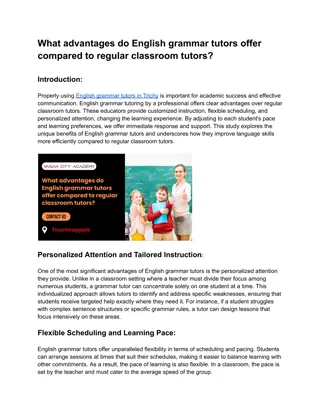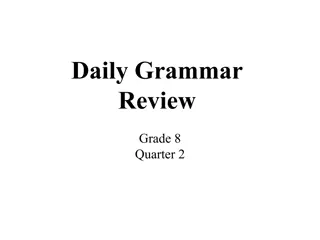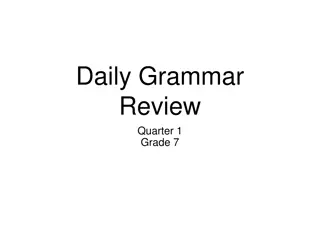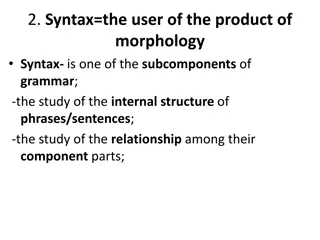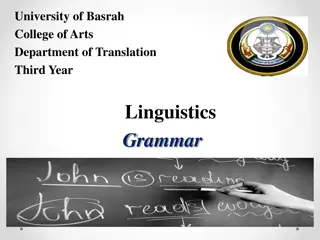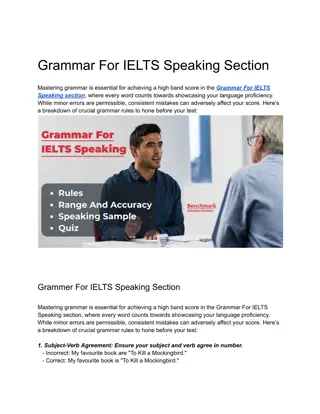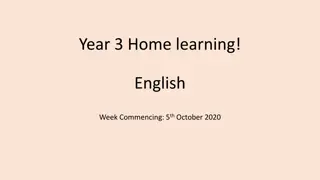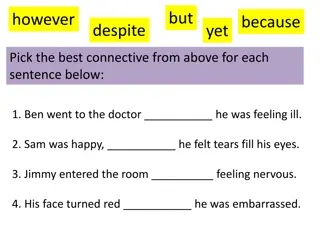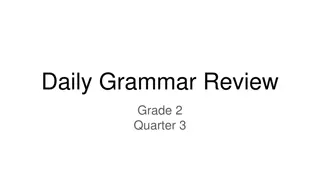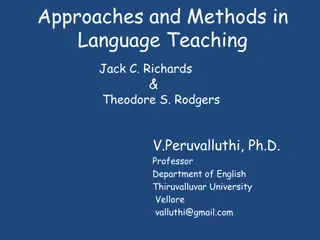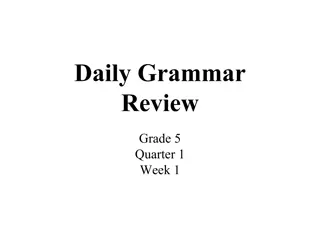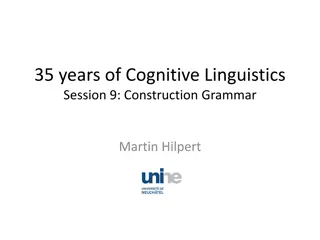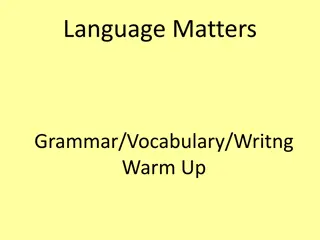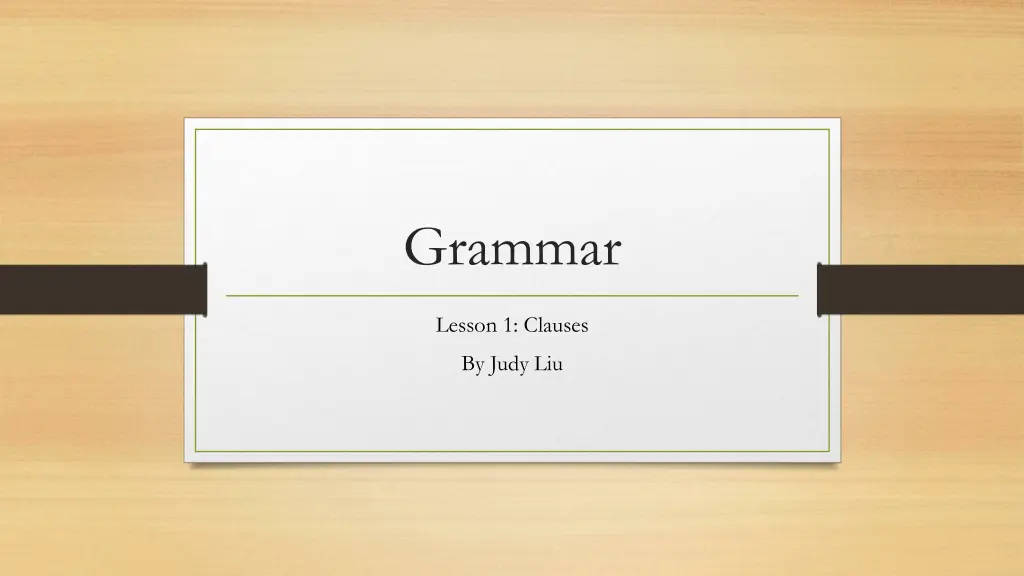
Understanding Clauses & Sentence Types
Learn about clauses, including their definition and different types of sentences such as simple, compound, complex, and compound-complex. Identify common mistakes to avoid in writing. Explore how to create compound sentences using conjunctions and conjunctive adverbs. Find out about common mistakes in compound sentences like comma splices and run-on sentences.
Download Presentation

Please find below an Image/Link to download the presentation.
The content on the website is provided AS IS for your information and personal use only. It may not be sold, licensed, or shared on other websites without obtaining consent from the author. If you encounter any issues during the download, it is possible that the publisher has removed the file from their server.
You are allowed to download the files provided on this website for personal or commercial use, subject to the condition that they are used lawfully. All files are the property of their respective owners.
The content on the website is provided AS IS for your information and personal use only. It may not be sold, licensed, or shared on other websites without obtaining consent from the author.
E N D
Presentation Transcript
Grammar Lesson 1: Clauses By Judy Liu
What I will present: Definition of a clause Different types of sentences Simple Compound Complex Compound complex Common mistakes
A Clause A group of words that has a subject and a verb
2 Types of Clauses He ate a hamburger Independent Clauses Subject Verb When he ate a hamburger Dependent Clauses Subject Verb Subordinating conjunction
Not a clause Eating a hamburger To study harder (There is no subject, and the verb form is not a verb)
Sentence Types 01 02 03 04 Simple Sentence Compound Sentence Complex Sentence Compound Complex Sentence
Simple Sentence A sentence consists of only one independent clause. Ex. I brought my friends some cookies. Subject Verb
Compound Sentence A sentence made by two or more independent clauses Ex. I went to the mall yesterday, and I bought some clothes. Independent Clause 1 Independent Clause 2
Making Compound Sentences 1. ; 2. FANBOYS (for, and, nor, but, or, yet, so) ______________________, but ____________________. 3. Conjunctive Adverbs _____________________; however, __________________. I like Chocolate ice-cream I am lactose-intolerant _________________; _______________. The birds are singing the kids are playing You can put wings on a pig you don't make it an eagle
Conjunctive Adverbs Used to add a similar idea, to add a result, to give an example, to add an unexpected continuation, etc. Ex. however, besides, furthermore, hence, therefore, for example.
Common Mistakes in Compound Sentences Comma splice Using a single comma to join two independent sentences Run-on Any compound sentence with improper punctuation or conjunction Stringy Sentence Joining too many ideas together through independent clauses
Complex Sentences 1 independent clause + 1 or more dependent clauses. If today were the last day of your life, would you want to do what you are about to do today?
Types of Dependent Clauses Adjective clauses Adverb Clauses Noun Clauses
Adjective Clauses Follows a noun or a clause and describes or defines it When the noun is specific, adjective clause is unnecessary. (describes the noun, commas are needed). The sun, which is a young star, is the source of all energy. When the noun is not specific, the adjective clause is necessary. (defines the noun, no commas) The song that came out recently is very popular. Conjunctions
Conjunctions Who Whom Whose When Where Why That Which
Difference Between Who and Whom Who Subject Ex. The man who was talking to me was a teacher. Whom Object Ex. The man to whom I was talking was a teacher.
Adverb Clauses A group of clauses that functions as an adverb; they begin with subordinating conjunctions. Ex. When, where, whereas, unless, if, while No commas before the subordinating conjunctions Except for whereas and while
Noun Clauses A dependent clause that acts as a noun Begins with words, such as how, that, what, whatever, when, where, whether, which, whichever, who, whoever, whom, whomever, and why Can act as subjects, direct objects, indirect objects, predicate nominatives, or objects of a preposition Ex. I know Toronto. I know where he lives.
Other Common mistakes Lop-sided Sentences Wrong Focus Unparalleled Sentences Choppy Sentences
Lop-Sided Sentences Top heavy Dependent, dependent, dependent, independent End heavy Independent, dependent, dependent, dependent Solution: Try moving the independent clause in the middle of the sentence, or breaking the sentence into smaller sentences.
Wrong Focus The focus of the topic sentence is usually near the end of the sentence. That s where key-words should be placed. __________________________,____________KEYWORDS_______. Ex. Although donuts are delicious, it will have side effects on the long run.
Unparalleled sentences Parallel structures are phrases or clauses that repeat the same word forms (nouns, verbs, adjectives, and the like) in the same order to perform the same function. Both and Either or Pairs for parallel structures Neither nor Not only but also Ex. Bob takes good care of his car, of his new house, and family. (Unparalleled) Solution: Bob takes good care of his car, of his new house, and of his family.
Choppy Sentences Too many short simple sentences, which makes a writing appear unsophisticated. Example She took dance classes. She had no natural grace or sense of rhythm. She eventually gave up the idea of becoming a dancer. Revised She took dance classes even though she had no natural grace or sense of rhythm; therefore, she eventually gave up the idea of becoming a dancer.



